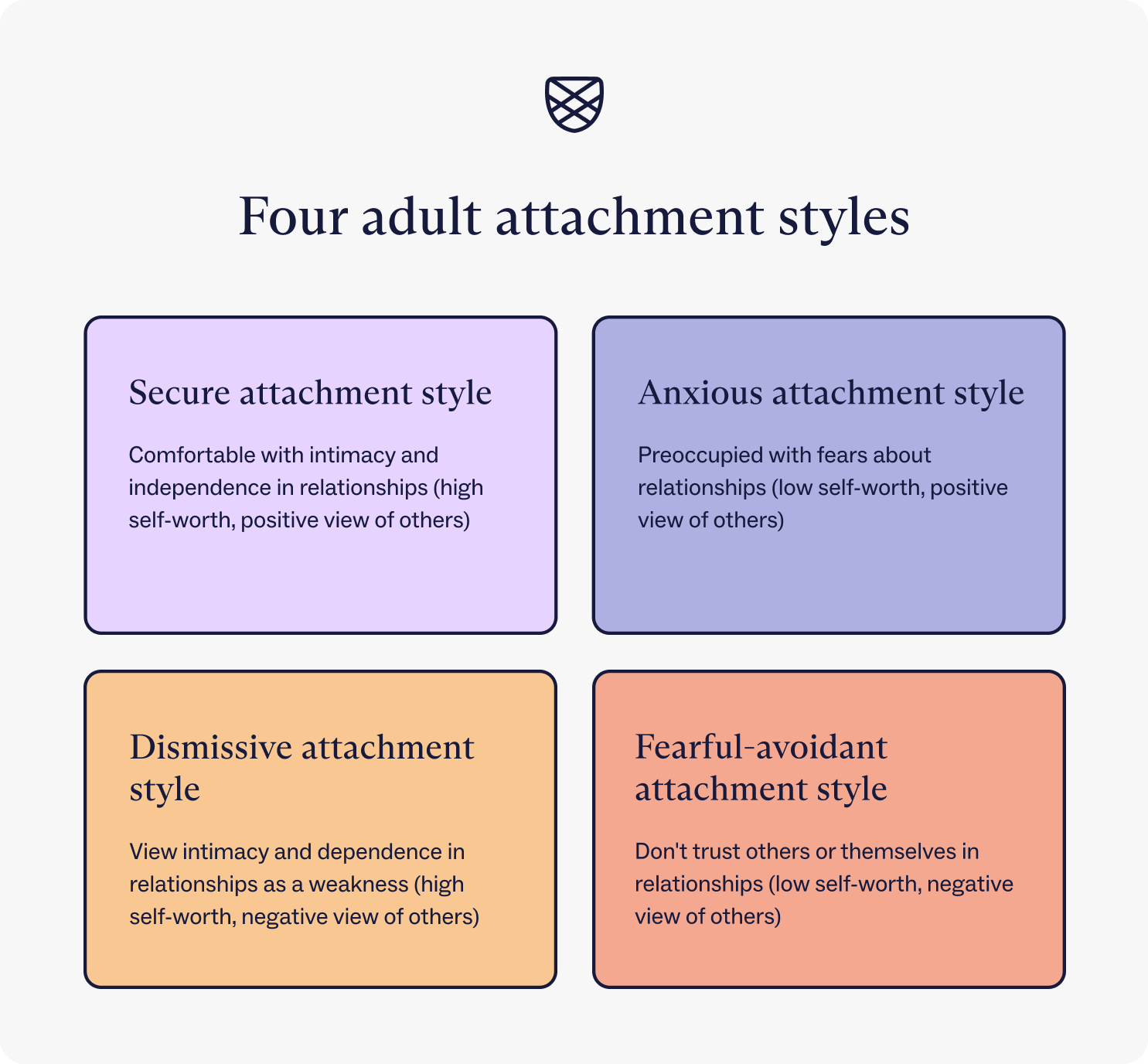
Table of Contents
Dismissive Avoidant Attachment Style: What You Need to Know

Written By: Dr. Rasna Kaur Neelam

Clinically Reviewed By: Dr. Don Gasparini
Updated: September 25, 2023
7 min.
Learn the causes and signs of the dismissive avoidant attachment style, marked by high self-esteem and relationship mistrust, and how to move toward a secure attachment style.
Learn more about our Clinical Review Process
Table of Contents
According to attachment theory, the connection people form with their caregivers during childhood serves as the basis for their approach to future relationships, referred to as their attachment style. A person’s attachment style encompasses their behaviors in various types of relationships, such as friendships, romantic relationships, family connections, and beyond.
There are four main attachment styles: dismissive avoidant attachment (also known as dismissive attachment or avoidant attachment), anxious attachment, fearful-avoidant attachment (also known as disorganized attachment), and secure attachment. Knowing your attachment style can help you better understand why you feel certain emotions regarding relationships.

This piece will focus on the dismissive avoidant attachment style, sometimes referred to as dismissive attachment or avoidant attachment for short. If you think you or a loved one has a dismissive avoidant attachment style, keep reading to learn more about how this attachment style manifests in relationships and discover tips for going from a dismissive to a secure attachment style.
What is the dismissive attachment style?
All four of the attachment styles are defined by how people view themselves and how they view others. People with a dismissive attachment style tend to have a positive view of themselves and believe they are worthy of love, attention, and other positive interactions. However, they have a negative view of others and believe people to be largely untrustworthy and unreliable. As a result, people with a dismissive attachment style may try to avoid depending on others or avoid intimacy in relationships altogether.
If someone has a dismissive attachment style, it usually means they view dependence as a weakness to be avoided. A dismissively attached person may be described as “commitment-phobic” or unwilling to “settle down,” but in actuality, they want to be in relationships—they are just worried that others will let them down and try to protect themselves against this pain by maintaining their sense of independence.

Signs of dismissive attachment style
In the research article introducing the four-category model of attachment styles, researchers asked students in an introductory social psychology course to fill out questionnaires about demographics, friendships, self-esteem, self-acceptance, sociability, relationships, and interpersonal problems.
From this social psychology research, the four main attachment styles were borne. This research also defined some common signs of the dismissive attachment style. Based on the students’ answers, we know that people with a dismissive attachment style typically exhibit the following signs:
Self-confidence
As mentioned, dismissively attached people tend to have a strong sense of self. On the one hand, this personality trait may mean that people with a dismissive attachment style are resilient and self-sufficient. However, self-confidence can also be a defense mechanism for people with a dismissive attachment style, as it can shield them against emotional vulnerability or leaning on others for help or support.
Emotionally reserved
Being emotionally reserved is a common sign of a dismissive attachment style. This emotional reserve often stems from deep discomfort with emotional intimacy and a strong desire for self-sufficiency. People with a dismissive attachment style tend to keep their emotions at arm’s length, avoiding open expressions of vulnerability (including sharing emotional needs or feelings or crying). They may downplay the importance of emotional connections with others and prefer to maintain a certain emotional distance.
Infrequent relationships
Having infrequent or shallow relationships with friends, family members, or romantic partners can signify a dismissive attachment style. People with a dismissive attachment style often prioritize their independence and self-sufficiency over forming deep emotional connections with others. They may keep a certain emotional distance from potential partners or avoid getting too close, which can lead to infrequent or short-lived relationships.

Dismissive attachment style in relationships
Here’s an example of what a dismissive attachment style looks like in relationships:
Jamie is an 8th grader with a dismissive attachment style. On the surface, they’re a smart and confident young person who does well in school. But Jamie’s parents are worried about their social life. Jamie has an easy time meeting new people but spends a lot of time alone by choice and says that people always let them down and are unreliable. They have one close relationship with another middle schooler named Sam. Still, when Sam asks them questions, they give surface-level responses and don’t open up much or try to further the emotional connection.
How does a dismissive attachment style develop?
As previously discussed, attachment theory suggests that early childhood care influences one’s attachment style in adulthood. In essence, your adult attachment style is significantly shaped by your upbringing. As a result, the following parental behaviors can contribute to the development of a dismissive attachment style. However, it is also possible for a person without any of the following experiences to develop a dismissive attachment style.
Inconsistent care
When parents are inconsistent in providing care and fail to respond consistently to their child’s needs, it can create an environment of uncertainty and instability. Children with inconsistent caregivers may develop dismissive attachment styles as they believe that people are untrustworthy and unreliable, like their caregivers.

Neglect or rejection
Children who experience or feel rejected in early childhood may develop a dismissive attachment style and come to believe that those around them will disappoint or abandon them. Rejection can include early childhood abandonment, inconsistent parenting, or being harshly criticized from a young age.
Overly critical or perfectionistic
Parents who are excessively critical or set unattainable standards for their child’s behavior or achievements may inadvertently promote extreme emotional self-reliance, which can translate into behaviors associated with a dismissive attachment style. Also, a child constantly seeking approval or fearing criticism may learn to suppress their emotions to avoid disappointing their parents—another hallmark of the dismissive attachment style.
What can I do if my partner has a dismissive attachment style?
If you are in a romantic relationship with a partner who has a dismissive attachment style, it’s essential to approach the relationship with empathy and understanding. Start by recognizing that their emotional reserve may be a coping mechanism they developed in response to past traumas.
However, fostering open and honest communication within your relationship is still important. If your partner has a dismissive attachment style, it may come down to you to encourage them to express their feelings, even if it’s challenging for them. Be patient and respect their need for space and independence while finding ways to create a secure and supportive environment in the relationship—giving them some space is actually a way that they may be able to more easily open up.
If your partner has a dismissive attachment style, you may want to consider couples therapy to work through any challenges stemming from attachment styles (a form of support that couples with all different kinds of attachment styles find beneficial). A trained therapist can provide valuable guidance and strategies to foster a healthier emotional connection and intimacy in your romantic relationship.
What can I do about my dismissive attachment style?
Addressing a dismissive attachment style involves self-awareness and a willingness to develop healthier patterns of relating to others—especially if the goal is to move from a dismissive to a secure attachment style. Here are some tips for dismissively attached people who want to address their attachment style and move toward a more secure attachment style:
Seek therapy
Addressing a dismissive attachment style requires reflecting on patterns of behavior and thinking associated with their attachment style—a process that can be easier with a licensed mental health professional. A therapist specializing in attachment issues or interpersonal relationships can provide guidance, tools, and a safe space to explore and address the underlying causes of your dismissive attachment.
Practice emotional expression
People who are aiming to address their dismissive attachment style can start by working on expressing emotions in a healthy way. Start with small steps, such as sharing your feelings with trusted friends or journaling your thoughts and emotions. Gradually, you can become more comfortable with emotional vulnerability.
Develop trust
Building trust in your relationships—including your friendships, familial relationships, and romantic relationships—is crucial. Take the time to get to know your partner or loved ones more deeply, and allow yourself to rely on them for emotional support when needed.
Trauma-informed therapy at Charlie Health for people with a dismissive attachment style
If you or someone you know is struggling with a dismissive attachment style stemming from trauma, Charlie Health is here to help. Our virtual Intensive Outpatient Program (IOP) supports people with complex mental health challenges through supported groups, individual therapy, and family therapy. We know that healing starts at the root, and sometimes that means better understanding your attachment style. Fill out this short form to get started today.





